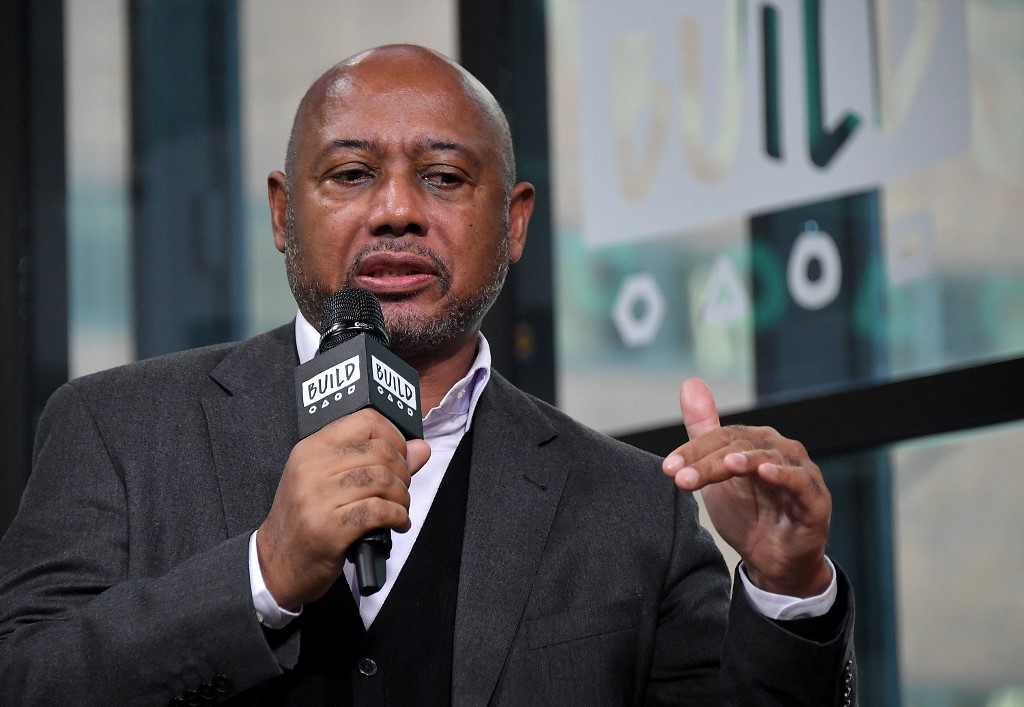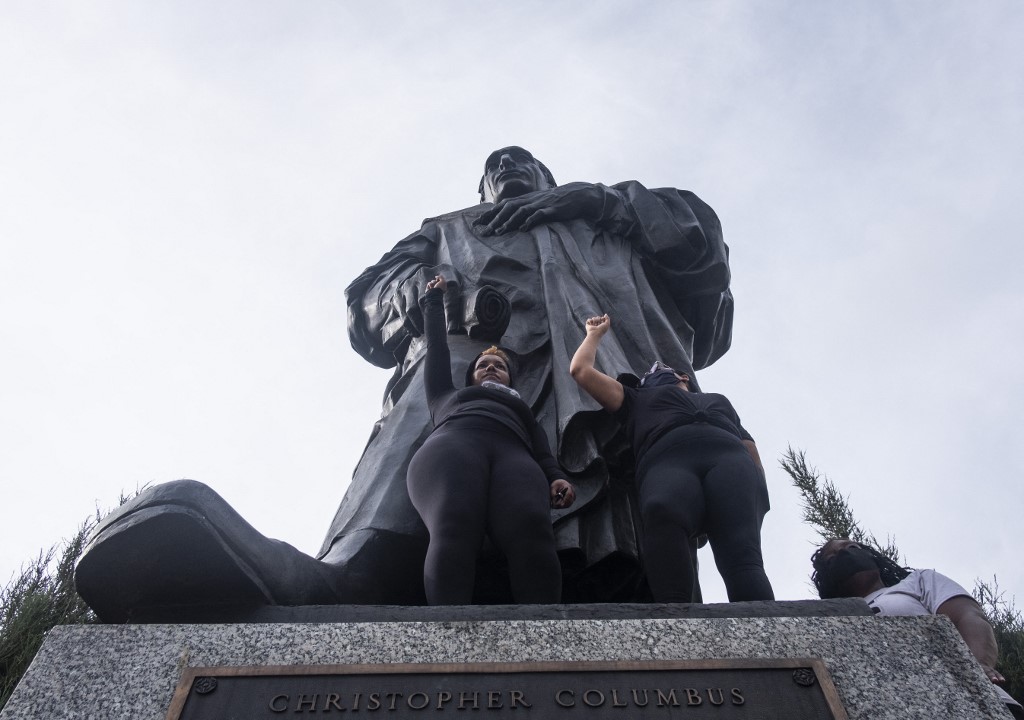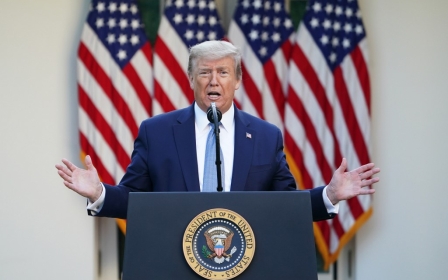Raoul Peck's bold elegy maps the terror of white supremacy

I first heard of Raoul Peck when I saw his powerful documentary I Am Not Your Negro (2016), a bold and moving film based on James Baldwin's unfinished manuscript Remember This House.
I knew of this manuscript, had seen most of the archival material Peck used, and have been teaching Baldwin for decades. But this film was something else: there was a tenacity of pain, narrated in the haunting voice of Samuel L Jackson, that commanded attention.
Prompted by my admiration for this film, I went back to Peck's oeuvre and realised there was a whole world out there. He has been at work since the early 1980s making shorts, features, documentaries and television series. His body of work presents a vision of the condition of colonialism and racism, with full historical awareness and his signature cinematic verve.
You need to stop and catch your breath; so much depravity and cruelty in human beings is hard to fathom, difficult to stomach
I sat down to watch Peck's most recent work, Exterminate All the Brutes, fully aware that he was extending the logic and reasoning of his previous films.
The documentary mini-series focuses on the link between European colonialism and genocide, divided into four episodes. Even if you are critically aware of the history of European and US racism and genocide, watching this film is a difficult and transformative experience.
New MEE newsletter: Jerusalem Dispatch
Sign up to get the latest insights and analysis on Israel-Palestine, alongside Turkey Unpacked and other MEE newsletters
There are moments that are hard to watch. You need to stop and catch your breath; so much depravity and cruelty in human beings is hard to fathom, difficult to stomach.
I kept thinking of that terrorising scene and voiceover passage in Terrence Malick's masterpiece The Thin Red Line (1998): "This great evil, where's it come from? How'd it steal into the world? What seed, what root did it grow from? Who's doing this? Who's killing us, robbing us of life and light, mocking us with the sight of what we might've known? Does our ruin benefit the earth, does it help the grass to grow, the sun to shine? Is this darkness in you, too? Have you passed through this night?"
Conquest and genocide
Peck takes the title of his film and much of its historical narrative from a book of the same title, Sven Lindqvist's Exterminate All the Brutes (which in turn takes that title from a line spoken by Kurtz in Joseph Conrad's Heart of Darkness), in which the Swedish author places the horrors of the Holocaust in the context of European colonialism.
In his book, Lindqvist explains in detail how Hitler was doing to European Jews what Europeans had been doing to the world at large. After the Holocaust, Europeans were made to remember and repent for the terrors they had committed, but they were in a rush to forget about their colonial atrocities, or to this day defend them as "civilising missions". They did not wish to see the uncomfortable link between vicious European antisemitism and the racist conquest and multiple genocides of the world at large.
Half a century before Lindqvist, another critical thinker, Martinican poet Aime Cesaire, said precisely the same thing in his Discourse on Colonialism, arguing that the rise of Hitler in Europe was foretold by the onset of European colonialism in Asia, Africa and Latin America - and that Europeans were aghast at Hitler not because of the nature of his evil, but because he had done it in Europe and to Europeans.
Peck does not begin his powerful new film with Cesaire, but with Lindqvist. The link between fascism at home and murderous colonialism abroad, however, is not exactly a secret. Beyond Cesaire and Lindqvist, critical thinkers from W E B Du Bois to Frantz Fanon, among others, have connected the dots.
The final words and the damning judgement of Kurtz in Heart of Darkness - "The horror! The horror!" - extends from German extermination camps all the way to European genocidal terrors around the world.
Plundering the world
The strength of Peck's mini-series, however, comes from his incorporation of two other major books: Haitian scholar Michel-Rolph Trouillot's Silencing the Past and American historian Roxanne Dunbar-Ortiz's An Indigenous Peoples' History of the United States.
Peck has had a personal friendship with all three writers, which he turns into a compelling component of his narrative, full of autobiographical accounts and home movies from his childhood. His documentary camera occasionally turns around and gives viewers a snapshot of the director.
Through an intimate reading of his historical sources, Peck weaves a gripping story from the Crusades, to the Spanish Inquisition, to Christopher Columbus's slave-trade voyage. One steady theme across history links the rise of Christian white supremacy to plundering the world and making it safe for greed and the commission of genocide against colonised people.
Peck pivots his narrative towards the US, roots it in Europe, and does not go anywhere near Israel, except for a brief reference to a suicide bomber - which he quickly ends with a terse: "Yes, it is complicated."
That said, Peck's strength is somewhere else. He addresses the root conditions of the naval superiority that facilitated European domination of the globe from 1492 onwards, which coincides with mastering the instruments of mass murder that culminated in the dropping of the atom bomb on Japan - not just with unsurpassed cruelty, but with deeply rooted racist hatred.
In this trajectory, the Christian conviction of a divinely ordained mission to civilise the world eventually yields to "scientific" theories of racial superiority, and ends up in German concentration camps. Peck dwells extensively on the Holocaust, giving his comfortably forgetful audiences the link between the genocide of European Jews, the European genocidal history that came before it, and the white supremacy movements in Europe and US that have come after it.
Permission to narrate
The link that neither Cesaire nor Lindqvist, nor indeed Peck, makes is the fact that the ideology of white supremacy is rooted in self-interest, not in ignorance. "You already know enough," Peck says, quoting Lindqvist. "So do I. It is not knowledge we lack. What is missing is the courage to understand what we know and draw conclusions."
I beg to differ. White supremacists neither lack knowledge nor courage to understand. It is in their vested interests to either deny or justify. Hitler knew what he was doing in Europe, as did Churchill in India. Neither those who deny the Holocaust nor those who write white supremacist history could be convinced. Alternative facts are real; delusions are real; white supremacy is real.
We narrate. We tell the truth. We outpace the lies that the ruling white supremacy has fed itself and force-fed the world
Former US president Donald Trump ruled this country and the world around it with wanton cruelty, precisely with those illusions, and some 70 million Americans still voted for him to remain in office.
The same is true in Europe, where millions more are neither ignorant nor lack courage to understand. They know all too well that they have maimed, murdered, raped and plundered the world. They don't regret it; they are proud of it.
So what is the point of films such as Exterminate All the Brutes or I Am Not Your Negro? It's very simple: we have retrieved and reclaimed the grand and the detailed narratives. We no longer need permission to narrate, as Edward Said would say. We narrate. We tell the truth. We outpace the lies that the ruling white supremacy has fed itself and force-fed the world.
It is cathartic, liberating and empowering for generations to come and see truth staged so well, so confidently, so boldly, so self-assuredly as in Peck's Exterminate All the Brutes. He should have started with Cesaire and concluded with Palestine. He did not. His vision is diminished, and the power of his bold and revelatory film compromised by such omissions. But, adding a prelude here and a postscript there does not erase the power of this bold and brilliant film.
The views expressed in this article belong to the author and do not necessarily reflect the editorial policy of Middle East Eye.
Middle East Eye delivers independent and unrivalled coverage and analysis of the Middle East, North Africa and beyond. To learn more about republishing this content and the associated fees, please fill out this form. More about MEE can be found here.







